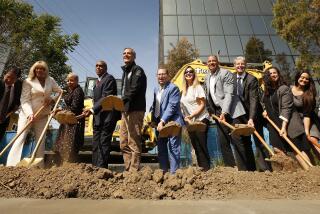Follow the law, not ‘industry standards’
- Share via
Question: Our owners and board try very hard to be fair and follow the law, but it doesn’t sit well with one of the self-appointed pooh-bahs. He is an attorney, and without prompting or request from the board, he sends out cleverly parsed opinion papers and lectures homeowners by rehashing his reasons why the letter of the law is not accurate. Then he proceeds to convince us that only his interpretation is right. All his rhetoric carries the same verbose excuse why the board should not follow the law exactly, and that’s because he says it’s “contrary to common understanding and practice in the industry.” He is confusing us, so we want to know which is right: common understanding and practice in the industry or the law?
Answer: Unless there is a specific legal exemption, laws apply to everyone, including homeowner associations and boards, and the laws must be obeyed.
In each type of development, governing documents set forth rules for operation of that association. For example, in Civil Code section 1363(d), the law requires that membership or association board meetings be conducted in accordance with a recognized system of parliamentary procedure or any parliamentary procedures the association adopts. Failure to do so is a violation of the law and may subject the board and its members to potential liability or to having the acts they take declared void.
As for an industry standard, assuming the reference is to the common-interest development or homeowner association-related industry, the statement is nonsense. An extensive search of the law and cases using the term “common understanding and practice in the industry” reveals no cases and no statutes using those words or any variations of them, meaning they are not a part of any California or federal law. Ignorance of the law is not an excuse for breaking the law. That phrase is not the legal standard in California.
Most laws pertaining to common-interest developments can be found in the California Civil Code, Government Code, California Administrative Code, Business and Professions Code, Evidence Code, Revenue and Taxation Code, Code of Civil Procedure, Health and Safety Code, Welfare and Institutions Code, Vehicle Code, Internal Revenue Act, some federal laws and case law.
There are many entities that may publish all or portions of the laws pertaining to homeowner associations and residential deed-restricted properties, but owners must be extremely careful not to mistake personal or published “interpretations” of those laws as a substitute for the law itself. This is a tempting, yet potentially costly mistake. The law is what the legislature and the courts say it is, not what any attorney, self-proclaimed authority or guidebook publisher says it is.
Statements made by vendors and association attorneys are only opinions subject to a determination of right or wrong by a judge, jury or criminal prosecutor. Any advice to disobey the law or act in accordance with “industry standards” as opposed to the law itself can easily be a disaster waiting to happen at the expense of the titleholders.
Questions can be sent to P.O. Box 11843, Marina del Rey, CA 90295 or e-mailed to noexit@mindspring.com.
More to Read
Inside the business of entertainment
The Wide Shot brings you news, analysis and insights on everything from streaming wars to production — and what it all means for the future.
You may occasionally receive promotional content from the Los Angeles Times.










